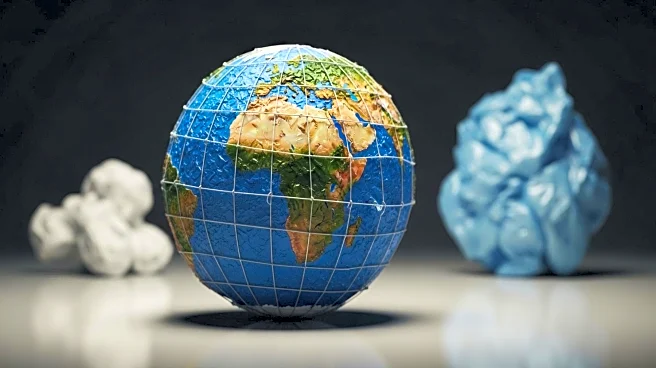What's Happening?
A coalition of scientists is focusing on the environmental pollution and waste management issues related to plastics. Recent discussions have highlighted the failure of United Nations talks to reach a global plastics treaty, which was anticipated to curb pollution. The talks involved representatives from over 180 countries but did not result in a deal. This has brought attention to the need for both national and international cooperation in addressing the plastic waste problem. Industry-led initiatives, such as TEL Plastics' commitment to using 25% recycled plastic by 2027, are examples of efforts towards sustainability. The debate continues on how to manage the lifecycle of plastics, with some experts advocating for responsible use and recycling to mitigate environmental impact.
Why It's Important?
The failure to reach a global plastics treaty underscores the complexity of international environmental agreements and the challenges in achieving consensus among diverse stakeholders. This has significant implications for global efforts to reduce plastic pollution, which is a major environmental threat. Without a binding treaty, countries may struggle to implement effective measures to manage plastic waste, potentially leading to increased pollution and environmental degradation. The situation highlights the importance of industry-led initiatives and national policies in driving sustainability efforts. Stakeholders in the plastics industry, environmental groups, and policymakers are directly affected, as they must navigate the absence of a global framework to address plastic pollution.
What's Next?
In the absence of a global treaty, countries may need to pursue bilateral or regional agreements to tackle plastic pollution. Industry leaders might increase their focus on sustainability initiatives, such as increasing the use of recycled materials. Environmental groups are likely to intensify advocacy efforts to push for stronger national policies and international cooperation. Policymakers may explore alternative strategies to address plastic waste, including stricter regulations and incentives for recycling. The ongoing debate on plastic management could lead to innovative solutions and collaborations aimed at reducing environmental impact.
Beyond the Headlines
The failure to secure a global plastics treaty raises ethical and cultural questions about the responsibility of nations and industries in addressing environmental issues. It highlights the need for a shift in consumer behavior towards more sustainable practices and the role of education in promoting environmental awareness. Long-term shifts may include increased investment in research and development of biodegradable materials and alternative packaging solutions. The situation also underscores the importance of transparency and accountability in environmental governance.









